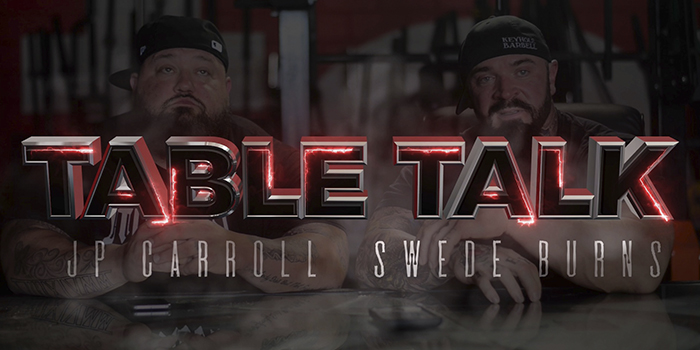
For the final Table Talk with Swede Burns and JP Carroll, the two elitefts team members discuss the similarities and differences between bodybuilding and powerlifting. Answering three questions on the topic, they begin by discussing the benefit powerlifters can receive from a bodybuilding background:
"How did your background in bodybuilding help you in powerlifting?"
Most importantly, Swede addresses the importance of muscle hypertrophy and the huge benefit it can be to powerlifters. More muscle means more stability, and especially if you aren't competing in gear, this is important for stabilizing the joints. If you're meager or underdeveloped, the likelihood of injury goes up. Lifting the same weight at a lighter bodyweight may be more impressive, but it's also likely more dangerous.
"What were the similarities and differences between the two?"
One of the biggest similarities in how Swede trained for bodybuilding and powerlifting is AMRAP (as many reps as possible) sets. Swede has always done AMRAPs, both when he was doing bodybuilding and also now as part of 5thSet. For bodybuilding, unlike with the 5thSet model, Swede would do AMRAP many times. So he may have loaded rack pulls up to 765 and done AMRAP, but then he'd do AMRAP again, and again, and again. This may not have been ideal, which is something Swede has learned over time. If one set to failure is good, two isn't necessarily better. Capacities like recoverability and adaptability are finite, which means you will experience diminishing returns as your push things further and further.
"Would you do it any differently if you were to do it again from a training and health point of view?"
Anyone who answers "no" to this question is probably lying — or hasn't learned anything along the way. Swede says he has made a lot of stupid mistakes, which is why he's made it his life's work now to help other people not make the same mistakes. You have to learn from the people who came before you.
He mentions Isaac Newton, who said, "If I have seen further it is by standing on the shoulders of giants." The thing to remember about Isaac Newton is that he said this as a way to respect every person that came before him, but he still transformed the world of science. Despite the fact that he greatly diverged from what had been done in the past, he still paid respect to those people.
The same should be true in powerlifting. JP points out that a lot of people fucked themselves up in the past so we wouldn't have to now. It would be stupid to not go back and realize the lessons we can learn from the mistakes of others.










